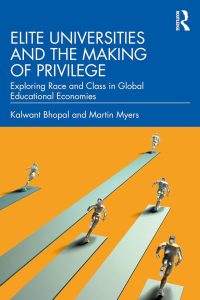Elite Universities and the Making of Privilege draws on current debates on education and inequality and considers the relevance of universities’ global brand identities. In this excerpt, authors Kalwant Bhopal and Martin Myers examine the concept of global brands and how the postgraduate students they interviewed at elite universities in the UK and US understood the value of the ‘brand’ of an elite university.
Global brands and the field of elite universities
 Although readily identifiable, brands are difficult to define or quantify. In particular they are difficult to value and are literally included amongst an organisation’s ‘intangible assets’ (Aaker, 1991). As an ‘intangible’ form of capital on corporate or institutional balance sheets their measurement by accountants is, ‘a conceptual practice – it is a form of attribution, recognition and figuring out’ that ‘resists accounting legibility’ (van Eekelen, 2015: 456). The graduate students who participated in this research, however, often identified the ‘brand’ of their elite university as something more tangible and recognisably signifying value.
Although readily identifiable, brands are difficult to define or quantify. In particular they are difficult to value and are literally included amongst an organisation’s ‘intangible assets’ (Aaker, 1991). As an ‘intangible’ form of capital on corporate or institutional balance sheets their measurement by accountants is, ‘a conceptual practice – it is a form of attribution, recognition and figuring out’ that ‘resists accounting legibility’ (van Eekelen, 2015: 456). The graduate students who participated in this research, however, often identified the ‘brand’ of their elite university as something more tangible and recognisably signifying value.
From my room I can see two car parks and any given day they are full of coaches. That’s coachloads of tourists who don’t come here to study but to buy into the brand. The big UK1. You can’t move for tourists from England. America. China. Japan wherever. All over the world. The name and the associations that are welded to it are overwhelming.
(Alexandra, UK1)
This awareness of brands is unsurprising given their ubiquity within commercial and non-commercial economies. Their use as a means of identifying information about an object’s origin and quality can be traced back at least 4,000 years to the Indus Valley, where seals were used as a mark of provenance and quality (Moore and Reid, 2008). The characteristics of brands have changed over time; noticeably so in the twentieth century becoming less concerned about conveying informational characteristics and more concerned to portray images associated with power and value and increasingly brand personality (Aaker, 1991; Moor, 2007; Murphy, 1990). This is often achieved by positioning brands as the drivers of shared, collective experiences in which the investment of individual consumers is within the brand itself, rather than a branded good (Hart, 1998; Murphy, 1998).
One consequence of shifts in brand positioning is that valuation of the brand also changes. The transformation of brands in late modernity is characterised by their emergence as signs that only have meaning in the context of themselves (Baudrillard, 1993); their valuation consequently reflects the logic of brands producing their own measures of value. The brand of Nike, for example ceases to be the brand of a shoe or multiple shoes, it is not even the brand of a footwear manufacturing company. Nike becomes a multiple-functioning range of brands (including NikeLab, Jordan, ACG1 and Nike Pro), that reinforce each other’s meanings and produce knowledge about the brand, that is understood universally. In this respect the brand is subsumed within its own organic structure; consuming the brand is irrevocably aligned with consuming the knowledge the brand produces. The knowledge produced by Nike is brand-led knowledge, its NSRL2 release, for example is, ‘an in-depth study of cold-weather running that resulted in ahead-of-their-time apparel solutions’ (NikeLab, 2021). Whilst the added value a brand such as Nike confers on a pair of running shoes was always a nebulous accounting calculation; the value of consumer investment in ‘ahead-of-their-time apparel’ has even less comparable context on which to assign value. Whilst the calculation of value that emerges in the relationship between the consumer, the product and the brand is a problematic equation to solve or quantify; it is a relationship that works on the recognition of the brand as meaningful. Many students cited the immediate recognisability of their elite university brand, not just in terms of Alexandra’s comments about tourists visiting the campus to buy branded goods but also in terms of the field of higher education,
My ambition right now is to clear this hurdle [PhD] and then work towards tenure. In a university like US1. The name is really significant. Every time I hear names like Harvard, Yale, Oxford they are loaded with credibility. No one questions my credibility right now because I’m at US1 and in the future I want that to carry on.
(Tom, US1)
And when asked to elaborate on why his credibility went unquestioned,
Every academic I meet immediately knows US1. It does not need an explanation. For me that is really helpful. It’s more than validation of the work being good. The name of US1 is taken for granted as absolute quality. What I am doing now is the leverage for working here in the future and never having to begin a conversation by justifying my position. The name avoids any doubt.
Tom was describing the recognisability the brand of US1 imposed on his academic authority that mirrors the recognisability Bourdieu identifies as significant to many forms of cultural capital (1986; 1989). The accounts of Alexandra and Tom suggested knowledge about the elite university brand was imbued with different understandings of value by different actors but that the overarching authority of the brand name was always unquestioned. In the institutional understandings of US1 and other elite university brands, the authority they imbue in forms of knowledge produced by their institutions is exponentially valuable because it is the cultural capital that legitimises academic knowledge globally. Tom’s description that he did not have to explain or justify his academic authority indicates that whilst all universities have brand identities, elite universities have brand identities that provide the ultimate legitimacy of whose value counts the most.
For universities, knowledge has a range of meanings and values. There is the ‘pure’ knowledge produced by research work and then there is knowledge about the production of that knowledge. One of the key intersections between knowledge produced and knowledge deployed as brand knowledge by universities is evident in the role played by elite universities. By nature of their ‘eliteness’ they are positioned to assess the value of knowledge production. By doing so, they have a potential means of overcoming the accounting difficulties identified by van Eekelen (2015); in effect their privileged position allows them to verify the greater value of knowledge they produce in comparison to that emerging from less elite universities. Their brand is both a feudal seal of provenance and quality; and, at the same time, it is much more. The brands of Oxford and Cambridge, Harvard and MIT are processing and structuring how knowledge is produced, valued and consumed.
© 2023 Kalwant Bhopal and Martin Myers
Elite Universities and the Making of Privilege: Exploring Race and Class in Global Educational Economies. Kalwant Bhopal and Martin Myers. Routledge. 2023.
- Read a review of Elite Universities and the Making of Privilege on the LSE Review of Books Blog
_____________________________________________________________________________________________
This post is opinion-based and does not reflect the views of the London School of Economics and Political Science or any of its constituent departments and divisions.
_____________________________________________________________________________________________
Image source: photo of dinosaurs at the Oxford University Museum of Natural History by Laurie Byrne on Unsplash





